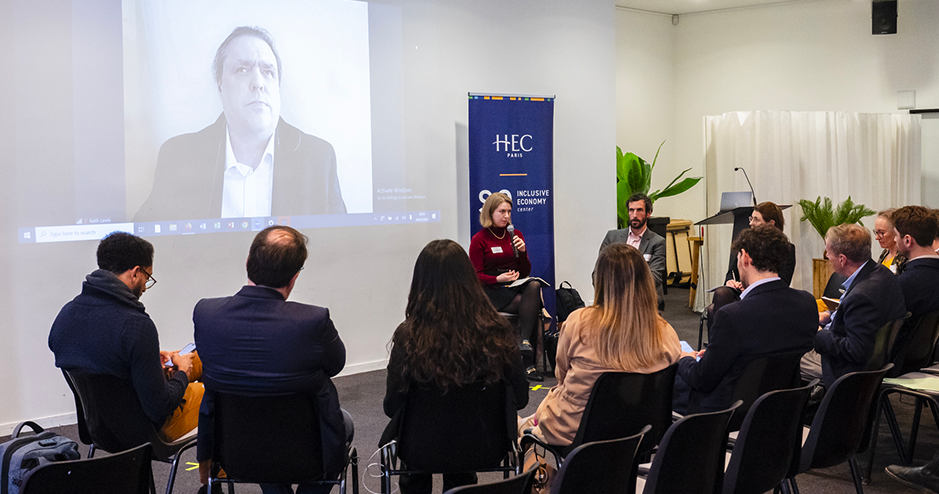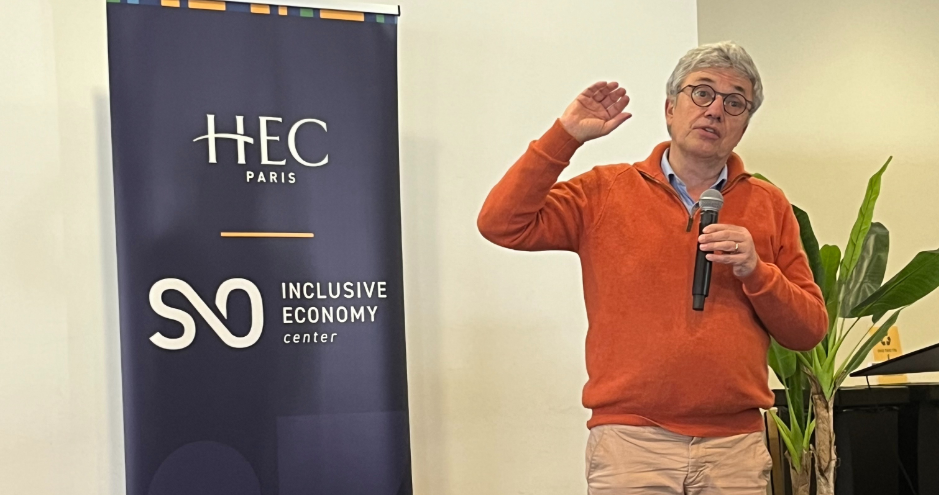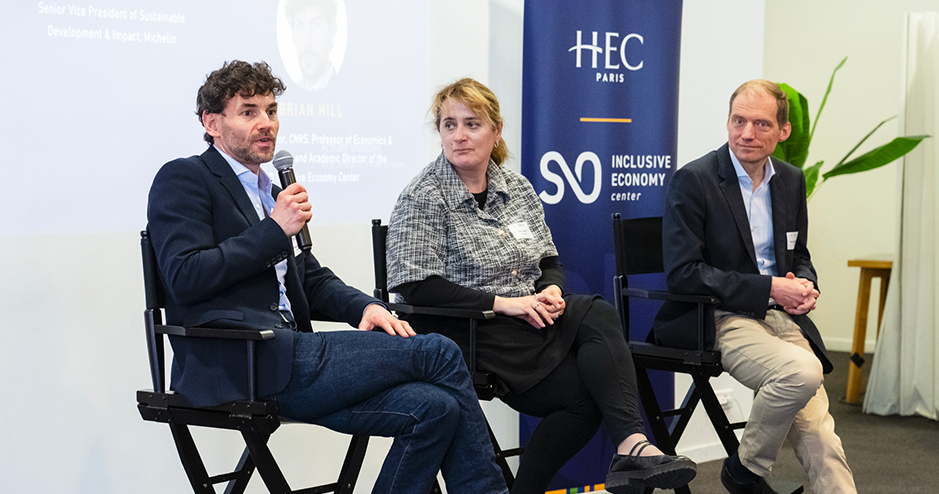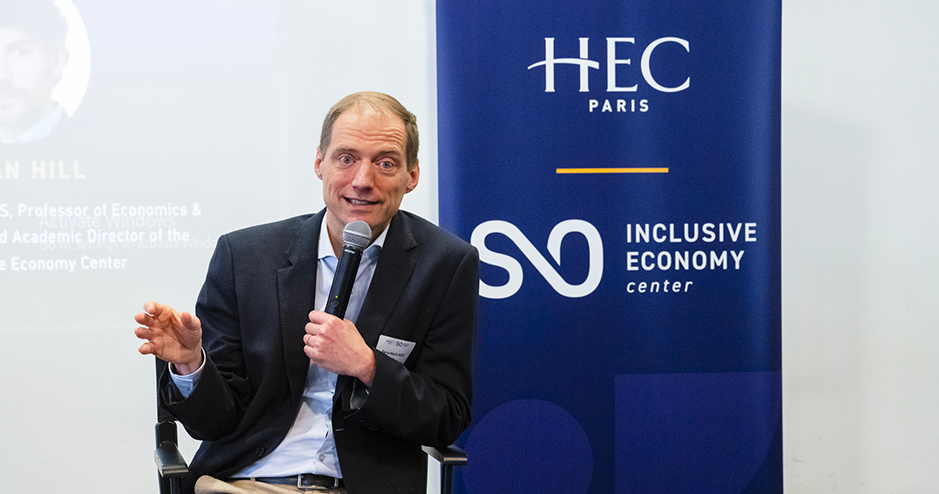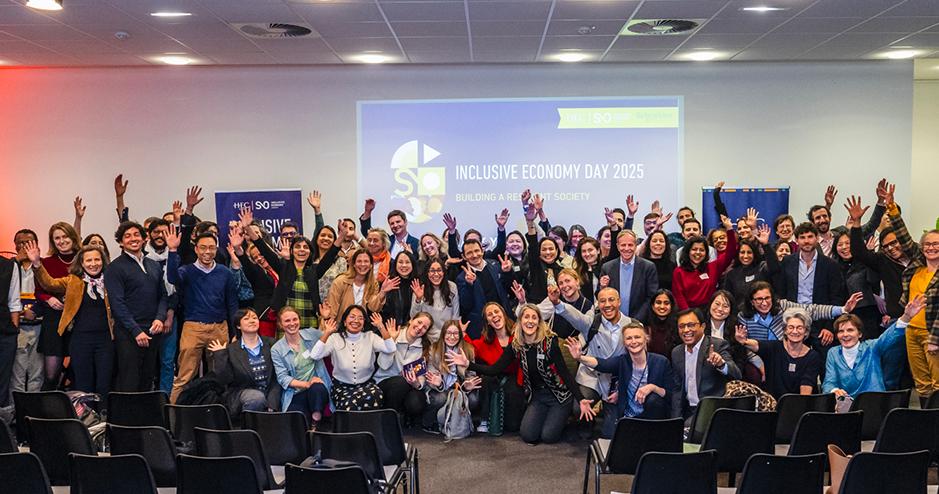Is the Inclusive Economy Resilient Enough for Today’s Challenges?
In a climate increasingly defined by social volatility and backlash, the concept of the inclusive economy finds itself at a crossroads. How defiant can IE remain?
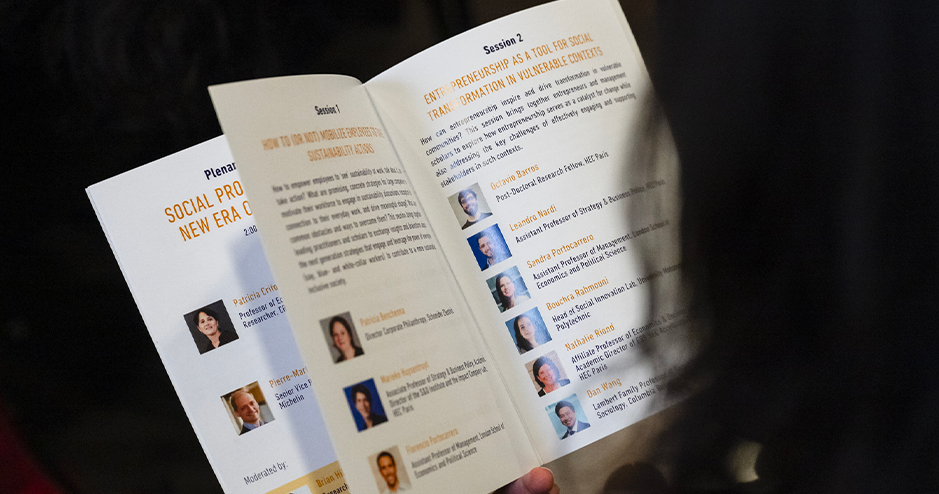
All photos © Marcella Barbieri
KEY POINTS:
- Top academic warns of a global backlash against social responsibility, calling for resilience and systemic redesign.
- Modern slavery survivor and multinational expose the ethical and logistical urgency of reforming supply chains.
- Michelin and grassroots entrepreneurs model inclusion through practical, community-first strategies.
- Digital inequality, affecting over 2.6 billion people, poses a major obstacle to inclusive growth worldwide.
- Emerging voices urge a shift from token participation to true co-creation and data-driven inclusion frameworks.
Once an aspirational framework for integrating social justice into economic growth, the inclusive economy now faces headwinds from political resistance, market skepticism, and institutional inertia. As Brian Hill, co-organizer of HEC Paris’ third Inclusive Economy Day (IE Day) on March 28, warned, "the wind has changed... The challenges are much larger." This shift, he contends, places resilience at the very center of the effort to reimagine inclusion.
Hill, a CNRS research director and Academic Director of the Inclusive Economy Centre, has shepherded the event since its inception. This year, his tone was strikingly different. "There is much more resistance than there was in previous years," he said. "Institutions which were friends are now no longer friends."
Confronting the Ethical Imperative
Yet, the notes of defiance and resilience are also growing. Keith Lewis, a survivor of modern slavery, delivered one of IE Day’s most compelling interventions. His testimony detailed his forced labor experience in the UK and underscored how trafficking often hides in plain sight. "This isn’t just a problem in developing countries. It’s happening everywhere," he warned during one of five breakout workshops at the event.
Lewis has helped draft the British Standard 25700 on organizational responses to modern slavery and now advocates for robust whistleblower frameworks within companies. His call was unambiguous: companies must be held accountable for abuses in their supply chains. "There should be clear reporting processes, not QR codes in toilets," he said, criticizing superficial interventions that miss the systemic nature of the problem. He suggested expanding the existing UK Anti-slavery Act which was implemented a decade ago to address the issue in business operations and global supply chains: “The situation is deteriorating day by day, and we should look to internationalize a fightback to move forward and move forward quickly.”
Mathieu Brachet of Schneider Electric offered a corporate perspective on this imperative. Brachet detailed his team's efforts to trace human rights risks beyond Tier 1 suppliers to his company, emphasizing the scale of the challenge: over 500,000 suppliers may be indirectly involved in their ecosystem. He underlined that most suppliers act on audit recommendations. "It’s not enough to walk away when you find problems. You have to stay and help fix them," he insisted.
Brachet also addressed the business case behind this work, citing reputational and regulatory pressure. “More and more laws, mostly from Western countries, are asking companies to act. When there is a law, it’s not very difficult to convince people to move. But when it comes to paying more to ensure living wages throughout the chain? That’s when it gets tough.” Participating in a related panel on systemic collaboration, Gilles Vermot-Desroches, Schneider Electric’s Chief Corporate Citizenship Officer, reinforced the importance of cross-sector coordination. His contribution underlined the company’s broader stated commitment to aligning corporate purpose with collective action across institutional boundaries. "We need a system where every product has a scorecard by default," Hill suggested. Voluntary and vague labels, he argued, are ineffective. His call to replace marketing gloss with objective indicators resonated across academic and practitioner perspectives.
Redesigning Social Value
Echoing this, Hill's keynote speech took a step back and suggested that goodwill might offer a way out. He situated resilience not as a defensive posture but as a proactive strategy. The lead author of a paper entitled “Are People- Willing to Pay to Reduce Inequality” presented recent research highlighting an often-overlooked asset: people’s prosocial attitudes. "People are fundamentally good," Hill argued, "but they need transparent, meaningful information to act on that goodness."
To this end, the professor in HEC’s Department of Economics and Decision Sciences proposed a systemic redesign of how products communicate social value. "Every product should have a scorecard by default," he said, rejecting the current voluntary labeling schemes as ineffective and opaque. Hill’s data-rich presentation made the case for replacing branding and marketing with objective, behaviorally informed disclosures.
That call for systemic redesign echoed the findings of the 2025 UNCTAD's Inclusive Growth Index (IGI), which has revealed deep, persistent gaps in equitable economic development across nations. Whether in terms of gender parity or environmental sustainability, progress remains limited, particularly in areas where voluntary commitments haven’t translated into real behavioral change.
Embedding Inclusion in Corporate DNA
For Pierre Martin Huchet, Senior Vice President of Sustainable Development and Impact at Michelin, inclusion means looking all the way down the supply chain. He works on ensuring that all stakeholders, including the two million smallholder rubber farmers the company sources, benefit from the company’s value creation. During the COVID-19 crisis, Michelin continued rubber purchases even when production halted, prioritizing community welfare over balance-sheet efficiencies.
"A company that builds its performance on human misery cannot be sustainable," Huchet said. His team has also implemented a global living wage initiative and launched training programs to help farmers improve yields while reducing environmental damage.
Similar sentiments were echoed by Bettina Hudry, a food-sector entrepreneur who stressed the need for financially viable business models that do not depend entirely on public subsidies. "We need to find ways to fund inclusive innovation sustainably," she said, advocating for new models of financing and impact measurement.
“We can see that in France this idea of putting beneficiaries at the heart of a business model still has a way to go,” she continued. “Having spent four years in Asia, I feel a greater commitment there; but it's very hard for corporate companies to find the right business models. Nevertheless, in the food sector, especially with smaller farmers, more and more initiatives have been done to have sustainable sourcing.”
The tension between long-term inclusion and short-term profitability remains a central challenge globally. As highlighted by IMF reports showing a 30% income growth gap between the EU and the US, market-driven reforms alone may not be sufficient. Deep policy integration and firm-level transformation are both needed.
Local Movements, Scalable Change
Aparajita Agarwal, a soon-to-be assistant professor at INSEAD, provides further original insights from India and Africa. Her research focuses on the interplay between formal institutions and informal mechanisms like social norms. Highlighting self-help groups in India where women pool savings to invest in their own enterprises, she shows how local, community-driven solutions can foster economic resilience.
"We tend to underestimate the creativity of informal economies," she said. "These are not passive victims but active agents of change." Agarwal emphasized that true scale requires trilateral partnerships - between government, business, and civil society - each bringing their unique strengths to the table.
This was a point also driven home by Athithiya Anantharajah, an HEC graduate and founder of the workshop series 8 to Impact, which addresses citizenship, gender equality, and disability inclusion. Anantharajah links her trajectory directly to education, describing it as the "foundation" that allowed her to transform vulnerability into agency. "If we're serious about scaling impact, we need to democratize understanding of the system itself," she said, especially for those historically sidelined by policy and practice.
Rethinking Metrics and Measurement
Khwan Kim, joining INSEAD from University College London, emphasized that the road to impact begins with refining how we measure it. "Current DEI indices oversimplify complex realities," he said. "We need consensus-based metrics that align both academia and industry." Kim highlighted the transformative role of digital technologies, particularly in the creative and cultural sectors, where marginalized voices have leveraged platforms like TikTok to break into closed markets.
Yet these very platforms pose new challenges. "We're entering a paradox," he warned. "Technology opens the door to more creators, but algorithmic curation risks homogenizing the output." This tension between democratization and control is likely to shape future debates around inclusive innovation.
His reflections are especially timely, considering the World Bank’s findings that over 2.6 billion people worldwide remain offline. Any vision of economic inclusion must now contend with the digital divide as a frontline challenge.
From Metrics to Mobilization: The Next Generation
The event also featured insights from emerging scholars who framed inclusion as not just a policy ambition but a democratic ideal. Marc Legrand, a PhD candidate at HEC Paris, argued for a new model of participation. "It’s not just about redistribution. It’s about giving people power, regardless of their status or influence," he said. For Legrand, governments and firms must co-create platforms that welcome civil society not as passive recipients but as co-architects of policy.
Kate Niu, a doctoral researcher at INSEAD, focused on the complex dance between firms and social movements. Her work shows that even when collaborations begin with instrumental motives, they often lead to authentic social gains. "Inclusive economy means access - access to education, opportunity, decision-making," she said. But she cautioned that marginalized voices remain too peripheral in many strategic decisions. "We need first-hand data, not assumptions, about lived experiences."
Niu also addressed the psychological dimension of working within organizations navigating dual missions. "It creates identity conflicts," she explained. "Employees feel torn between profit motives and social goals, and that tension affects everything from morale to decision-making."
Strategic Reckoning in the Age of Resistance
The Inclusive Economy Day 2025 did not conclude with easy answers. Rather, it set the stage for a more complex, more urgent conversation. Michael Posner, Director at NYU Stern's Center for Business and Human Rights, warned of the enduring dominance of shareholder-first models. "The ghost of Milton Friedman is alive and well," he said, even as more long-term investors begin asking about human rights and sustainability.
In a world where institutions themselves are under pressure -- from backlash against DEI to fears of regulatory capture - the inclusive economy must do more than survive. It must evolve.
As the event came to a close, it was Professor Brian Hill who brought the reflection on inclusive economy full circle. In an interview after the conference, he acknowledged that 2025 presented a uniquely challenging environment, but he also reaffirmed a broader mission: to forge new bridges between research, business, and public action. "Maybe our ecosystem needs to be rethought," he admitted. "But that rethink must be radical, not cosmetic. We need to understand that resilience isn’t just about resistance - it’s about imagination, strategy, and shared purpose."
REPLAY OF ALL THE SESSIONS: AVAILABLE HERE
